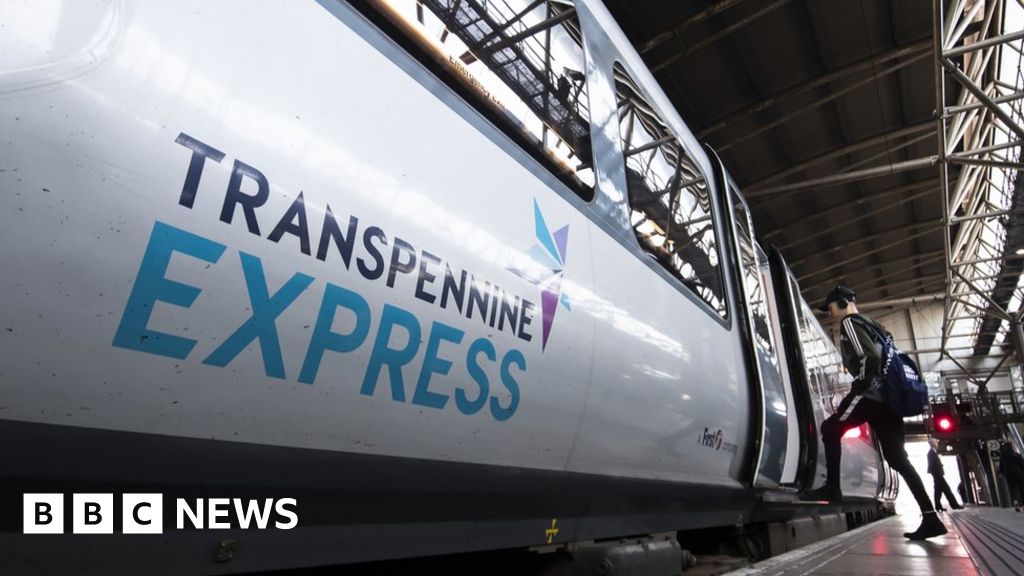What Has TransPennine Express's Record Actually Been?

Train company TransPennine Express (TPE) has lost its contract after months of poor performance.
It will cease to operate its routes across the North of England and Scotland on 28 May, with control passing to the government.
BBC News analysed official figures from industry regulator, the Office of Rail and Road (ORR), to examine how TPE's services have fared in recent months.
What is the background to this?
TPE's services began to experience ongoing disruption in early 2022.
The company said it was affected by high staff sickness levels and the coronavirus pandemic delaying the training of new drivers.
This has been compounded by its lack of an agreement with unions for drivers to work voluntary overtime. The union Aslef has accused the company of relying on this instead of recruiting enough staff.By December, TPE was one of three operators said by the government to be responsible for "unacceptable" services across the North of England.
How many trains get cancelled?
The latest figures show TPE cancelled about one in six (16.9%) of its services in March - the highest rate of any train company, but an improvement on January and February, which saw about a quarter of services cancelled.
Most cancellations happened up to 22:00 the night before the service was scheduled due to a lack of staff, a practice known as "pre-cancelling" or "p-coding".
The main purpose of pre-cancellations is to adjust emergency timetables when poor weather or infrastructure damage requires unexpected changes.
Figures on these additional cancellations have only been published since February, after the ORR asked train companies to provide the data to reflect the true impact on passengers. It means a full comparison with previous months is not available.
Are trains arriving on time?
The timeliness of TPE trains improved slightly in the latest figures to March, after a sharp decline in September.
About half of services arrived late, which is defined as a minute or more after the scheduled time. For all operators in Great Britain overall it was 29%.
While figures suggest the company's current punctuality rates have improved on the period before the pandemic, they do not take into account the fact that the number of services has been reduced by around a third.
There was a similar trend in longer delays. In March 5.7% of trains arrived later than 15 minutes after the scheduled time, an improvement on December but still about triple the score for all operators.
How many trains are there?
In December, when there was disruption due to industrial action, TPE recorded the lowest number of trains planned in timetables since records began in 2016, at about 3,500.
The company planned to run about 6,000 trains in March. This was slightly more than planned over the same period in 2022, but about 2,500 fewer than in 2020.
These figures only count the number of planned services, before on-the-day cancellations are made.
Including trains cancelled the previous day - which are removed from the official figures and do not count as being planned - at one point TPE timetabled about 6,600 trains in March.
What happens when TPE is nationalised?
The government has chosen to bring TPE under public control with the Operator of Last Resort (OLR) from the end of May.
The OLR, effectively a government-run train company, manages rail contracts that are brought into public ownership, with a view of eventually returning them to the private sector.
Under the OLR, the government has said services will run as normal with no changes to tickets, timetables or planned services, but the overall aim is to improve performance.
Northern, London and North Eastern Railway (LNER) and Southeastern are also run by the OLR.
What has TransPennine Express said?
FirstGroup, the company which owns TPE, said it was disappointed by the government's decision not to renew the contract it has run in various forms since 2004.
"Our team have worked extremely hard to improve services, including by recruiting and training more drivers than ever before," said Graham Sutherland, FirstGroup's chief executive.
Additional reporting by Wesley Stephenson and Hope Bolger
From Chip War To Cloud War: The Next Frontier In Global Tech Competition
The global chip war, characterized by intense competition among nations and corporations for supremacy in semiconductor ... Read more
The High Stakes Of Tech Regulation: Security Risks And Market Dynamics
The influence of tech giants in the global economy continues to grow, raising crucial questions about how to balance sec... Read more
The Tyranny Of Instagram Interiors: Why It's Time To Break Free From Algorithm-Driven Aesthetics
Instagram has become a dominant force in shaping interior design trends, offering a seemingly endless stream of inspirat... Read more
The Data Crunch In AI: Strategies For Sustainability
Exploring solutions to the imminent exhaustion of internet data for AI training.As the artificial intelligence (AI) indu... Read more
Google Abandons Four-Year Effort To Remove Cookies From Chrome Browser
After four years of dedicated effort, Google has decided to abandon its plan to remove third-party cookies from its Chro... Read more
LinkedIn Embraces AI And Gamification To Drive User Engagement And Revenue
In an effort to tackle slowing revenue growth and enhance user engagement, LinkedIn is turning to artificial intelligenc... Read more

